‘I SAID WHAT I SAID’ SUE ME…
Of the many new forms of media that have popped up since the advent of the internet, podcasting is the medium that feels the closest to a conversation, because it usually is. In our corner of the globe, more and more people are tuning in to their favorite podcasts on their morning commute or while performing tasks. Among these new podcasts, I Said What I Said (ISWIS from here on) has struck a particularly strong chord with listeners. The podcast format is quite simple, typically featuring co-hosts Jolaoluwa Ayeye and Feyikemi Abudu and a guest of the week. Funny, witty, and insightful, it’s easy to see why their ‘pod’ is such a hit. In their interview with DOWNTOWN’S Boluwatife Adesina, they discuss how they started out, growing pains, favorite guests and much more.
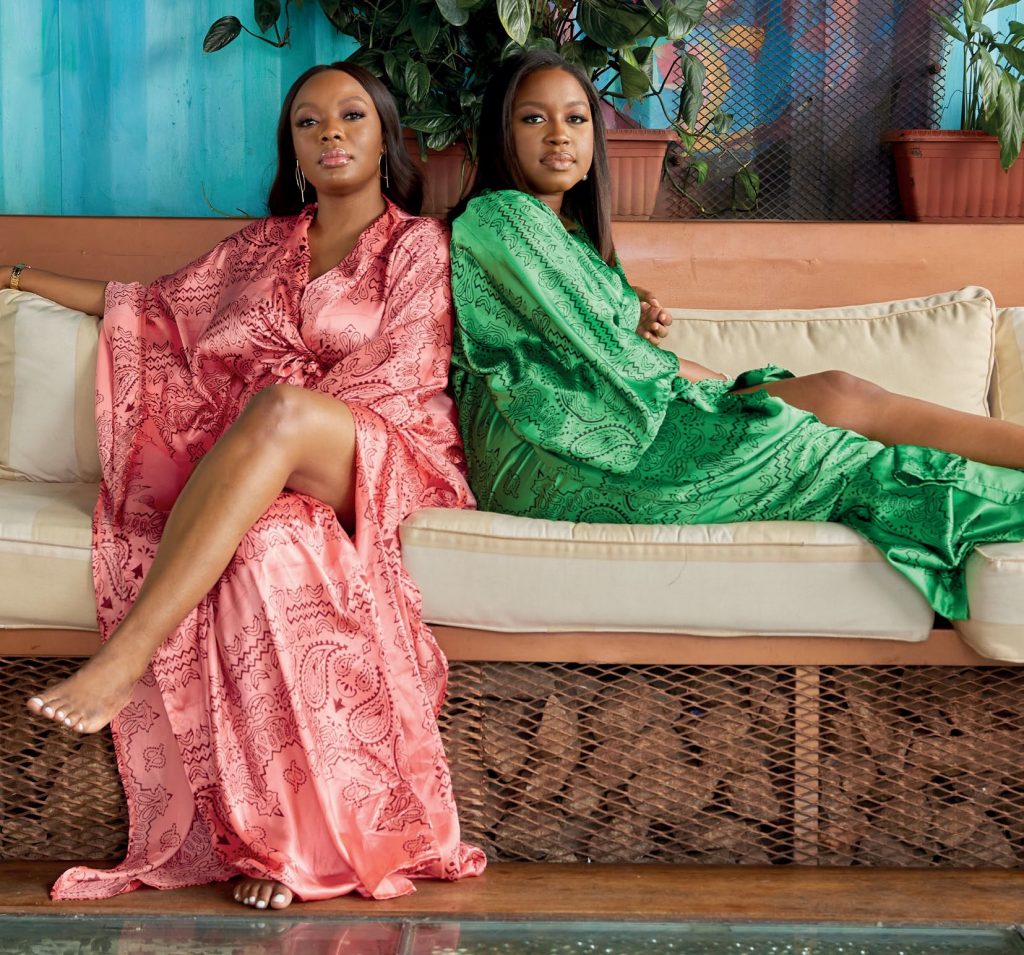
Jola Ayeye and Feyikemi Abudu
How did the idea for ISWIS come about? Who brought it up first?
Jolaoluwa: I sent Feyikemi a message about doing one together. I still have it on my WhatsApp. [laughs]
Feyikemi: It was entirely Jola’s idea for us to do a podcast. She messaged to remind me about it one day and I said “ I think we move!”. That was four years ago and I’m very glad that we did move.
What are some of the everyday constraints that come with podcasting in this Nigeria?
Jola: Explaining to people and brands what exactly a podcast is. People want to work with us more and more, and we have to explain that getting the most out of the podcast is not going to be a cut-and-paste format.
I remember reading that prior to ISWIS kicking off, there were a number of delays. What were some of the circumstances that led to these delays?
FK: We didn’t take it that seriously at first. I don’t think we had any idea it would become what it has become.
Jola: It was really about finding [the right] fit and a great studio to work with.
If you could have anyone as a guest on your next show, who would it be?
Jola: Anyone in the world? I have a long list oh. Beyoncé maybe? I love Issa Rae and Reese Witherspoon so they are definitely people I want to talk to. I’m also fascinated by people that are able to build massive businesses and products that change millions of lives so Jeff Bezos, Jack Dorsey… there are way too many people honestly .. Chimamanda, Genevieve …
What is the podcasting landscape like in Nigeria at the moment? How much room for growth is there here compared to other countries?
Jola: It’s wide open and that really isn’t unique to Nigeria. It’s pretty much a matter of interest and determination to be consistent. There’s room for many kinds of podcasts; sports, Pop culture, business, religion, music, news, global affairs – anything really. I think we’ve barely scratched the surface.
FK: The podcast landscape is small in terms of the number of people that listen to podcasts regularly, but it is definitely growing. I’m seeing new podcasts come up almost every week. The more people listen, the better for the whole industry.
What are three other podcasts you’d recommend to my audience and why?
Jola:
- 90s baby podcast – I cry from laughter every single episode
- Death Sex & Money – It’s a podcast that talks about 3 things people need to talk about but find really, really difficult.
- The Ezra Klein show – He is really clever and so are his guests. I think quite a bit after every episode
Nigeria as a whole got into podcasting relatively late. Would you know some reasons as to why?
FK: It’s sometimes just how trends are. We leapfrogged the natural progression in a few sectors like fintech, but we’ve been a little bit slower with newer media. Radio is still very popular here and that has been the main form of audio entertainment. I think people will catch on quickly.
Jola: Information and awareness. People still ask us what exactly a podcast is, millions of streams and downloads later!
Are you looking into video pods? I know Ezra (Oluebi) recently started one. As an extension of the format. Is it something that intrigues you?
Jola: We already have a YouTube channel that has abridged 10 – 30 minute versions of the entire podcast. It’s doing pretty well actually and we like it.
What are some of the mistakes that you made while starting out?
FK: We weren’t consistent at all starting out. People would have to almost beg us to get an episode out. We didn’t treat it like it was anything, but the consistency we have now has paid off in ways we couldn’t have imagined.
Jola: We weren’t a weekly podcast – it was every 2 weeks and we weren’t consistent.
In your opinion, what is the most important personality trait/strength someone would need to work in podcasting?
Jola: Consistency and thick skin.
What goes into the guest selection process? Is it always a joint decision?
Jola: Who do we vibe with or think would have an interesting story to tell. More and more we consider our audience and who we think they would enjoy hearing from or about!
FK: It’s quite flexible. Sometimes we have the exact same idea and other times, one of us is more convinced than the other about something specific. We trust each other, so it mostly comes down to that. It’s definitely a team effort.
Jola, tell us about your site, Happy Noisemaker. How did the idea come about and what are some hopes for it?
Jola: Oh Happy Noisemaker is a place I make even more noise, make people laugh but most importantly, talk about books. I love books and reading a lot, so I decided to start Happy Noisemaker to share that with people. I’m revamping the site so for now, the Instagram – Happy Noisemaker is where it’s at!
What is a common myth about podcasting? Debunk it, please.
FK: That it’s easy to do. While I enjoy it a lot, it’s almost like a second job. Like with any form of content, you have to work at it to make sure it is good.
Jola: Myth? Ah, I don’t know oh. Maybe that it’s some sort of difficult task. Growth is difficult oh, but starting really isn’t.
How would your parents describe what you do?
Jola: I don’t know that they really know what is going on. They just say “Jola works in media”.
FK: They used to think we make noise on the internet. Now that they have been to the live show, and have listened to snippets of the podcast, I think they really get it more than they did before. It’s still quite a shock to them that people spend hours listening to us every week and even look forward to it.
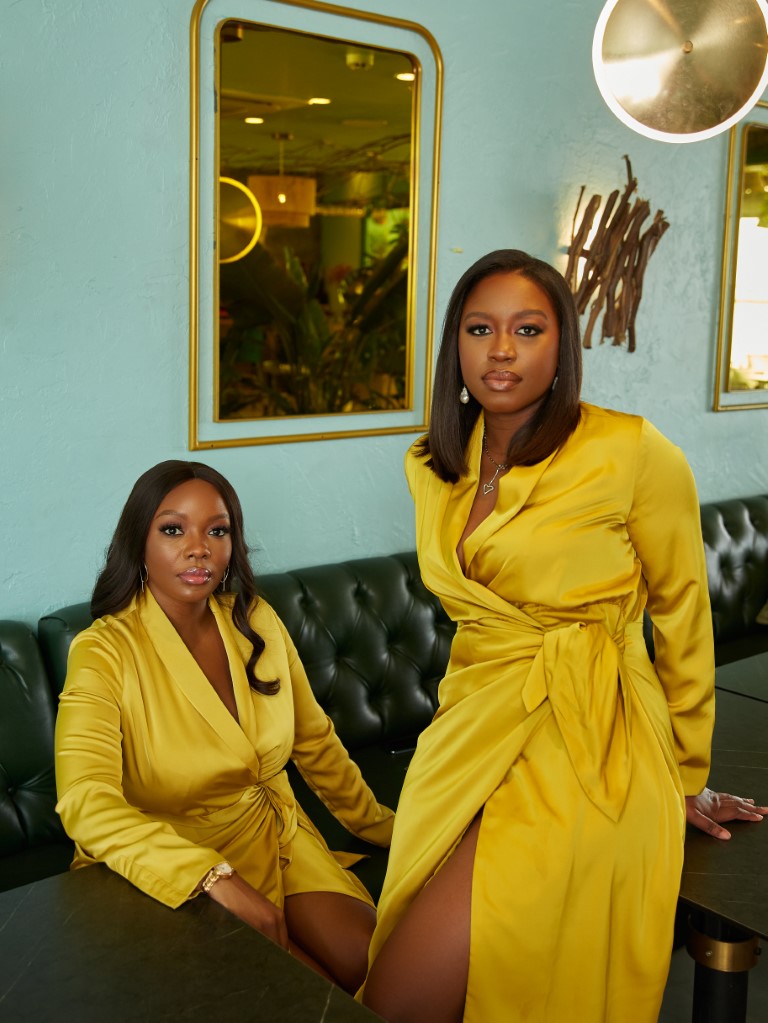
Jola Ayeye and Feyikemi Abudu
Where do you see the podcast in five years?
Jola: That you asked us about where we will be in five years is making me happy. That means you think that it’s possible. Way bigger. Millions of listeners every week. Sold out global tours….
How has this occupation impacted your family? Do they ever want to come on the podcast?
Jola: They can’t believe people find me that interesting because I talk all this talk at home and quite frankly they are tired of me. I don’t think they want to, but my dad wouldn’t mind. My mum would honestly rather chew jeans [laughs]
How does Jola have so many funny stories to tell? Do you actively pay attention for funny stories to present themselves as you go about Lagos?
FK: Haha, Jola is a writer so her eyes and ears are always looking for stories all over. I think it comes naturally to her.
Jola: I have an erm … interesting sense of humour. So, many things are actually not funny but I find them funny. It’s my personality
If you could start a business tomorrow, what would that business be?
Jola: A rice and stew food truck in Marina. Trust me I’ve been thinking about it for years. Hot fluffy white rice with different types of stew – assorted meat, chicken, fish, turkey, and goat meat. Each stew will have a spicy and regular variation. No other type of rice or food. Just white rice and different types of stew. Of course, there will be plantain and moin moin as sides. I’ll be rich.
Jola: What is a funny story your family tells about you that you’d like to share?
Jola: I don’t know that there is one in particular but it amuses my dad, a man who has built an incredible career in finance for decades that he is more and more being recognized as “Jola’s dad” or “Jollz’s dad”
What do you think makes your podcast stand out as much as it does? The relationship between you or what do you think?
FK: I think it’s mostly the fact that when you are listening to us, it feels like you are sitting and gisting with your friends. It’s the feeling we hope to create, so I’m really glad people comment on that often.
Jola: I really don’t know. Maybe our sense of humour, and the way we relate to our guests. I really can’t say for sure because it amazes me that thousands and thousands of people really listen to my friend and I talk every week!
Who have been your most important professional mentors?
FK: Generally, when it comes to business, the women in my family inspire me the most. There’s my grandmother, Mrs. Dupe Sagoe who is an institution in the lace industry, my mum Ekua Akinsanya, who founded Greenwood and sits in leadership positions in several associations, my aunty Mo Abudu who is trailblazing with Ebony Life, my other aunt Aunty Araba Morakinyo with Araba’s Homemade and my aunty, Deola Sagoe.
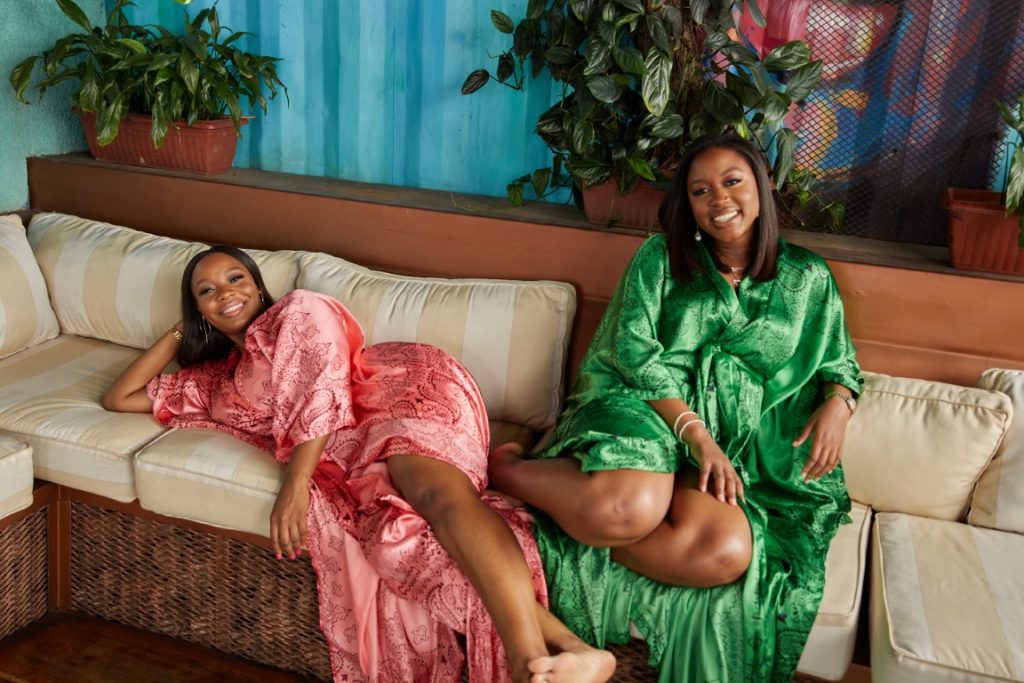
Jola Ayeye and Feyikemi Abudu
What occupation (other than your own) would you like to try?
Jola: A rich woman. That’s what I’d like to try. Wealth and being wealthy as an occupation.
You recently had your first live show. I listened and thoroughly enjoyed the format. Is this something you’re interested in doing more often?
Jola: Not too often oh! But yes, in more cities for sure.
FK: Definitely! I was really nervous about it at first, but there was something very special about seeing people actually enjoying themselves in person and getting to interact with them. People actually came to take pictures with us which is still quite surprising to me.
What do people misunderstand about you most?
FK: You’ll have to ask them. I try to focus more on the people who do understand me, but I think sometimes people assume I have other motives than I do when I say or do things. Particularly after End SARS. You’ll always get that on the internet though and there are a lot more people who support us than there are people who are committed to misunderstanding us.
Jola: I think our sense of humour. People new to what we do will come across a clip from the podcast and take it out of context. The aim here is to primarily give people something to smile about in a country that often does everything in its power to prevent just that.
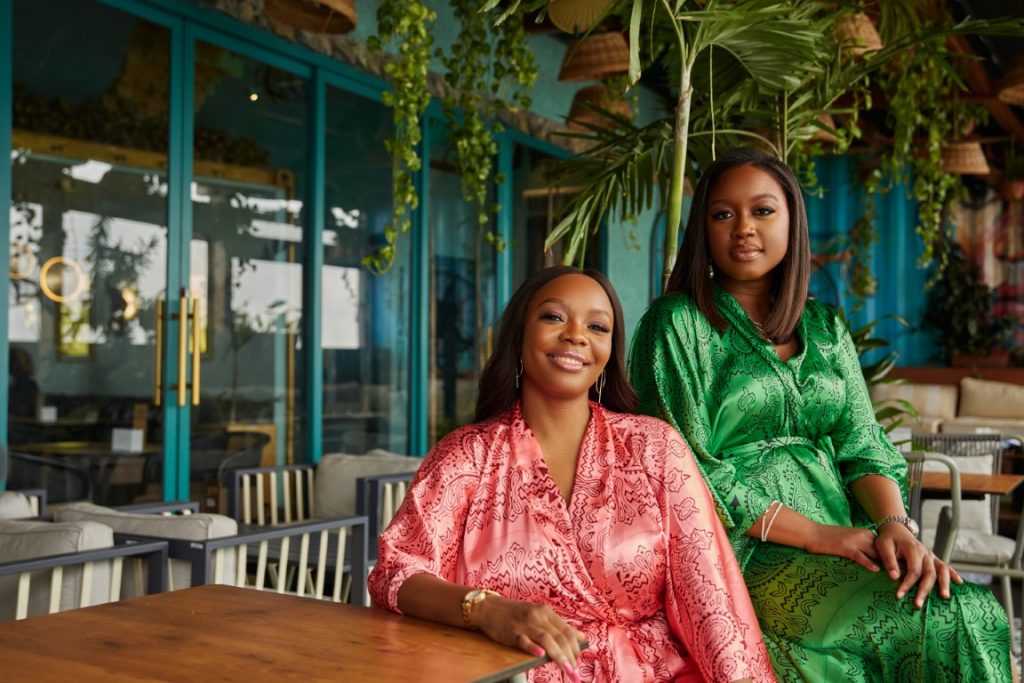
Jola Ayeye and Feyikemi Abudu
What will you tell anyone who’s starting a podcast? How can they grow as quickly as your podcast has?
Jola: Just start, be consistent and sift through feedback. You’ll be fine.
Where can listeners find you online?
You can check out our website – isaidwhatisaidpodcast.com. Or look for I Said What I Said on Spotify, Apple Podcasts, Google podcasts, SoundCloud, and anywhere else podcasts are found. We’re also on YouTube – I Said What I Said podcast.
Boluwatife Adesina is a media writer and the helmer of the Downtown Review page. He’s probably in a cinema near you.




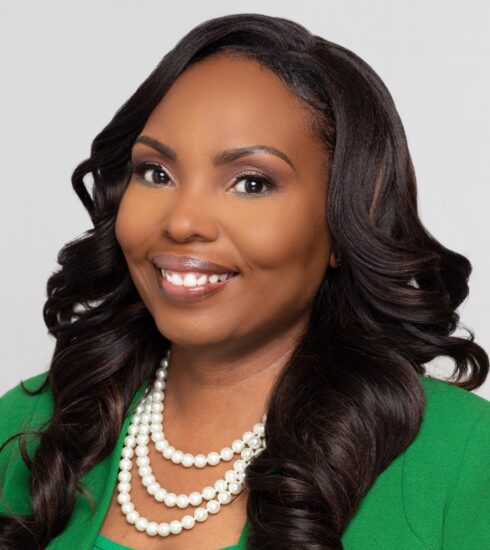
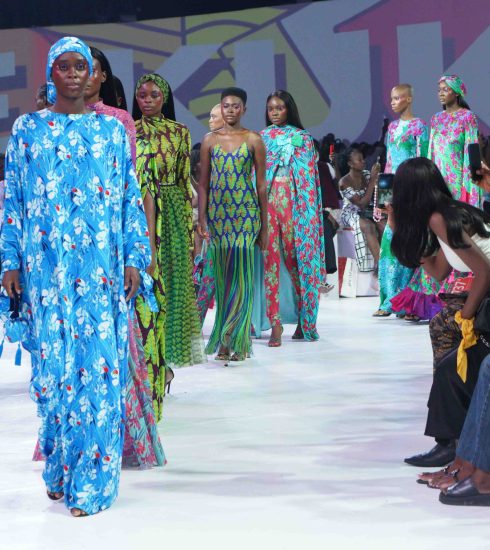
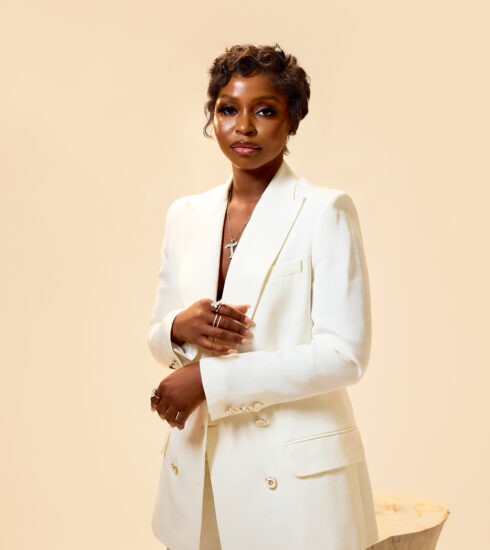
Adiya
4 years agoBeen listening to them since they started and now I can’t imagine my Wednesday without an Iswis episode. Please keep up the great work! Also..dec tour for IJGB! We’ve been asking on your YouTube channel ohh
Duke
4 years agoThe Bounce is Bouncing!!!!!!